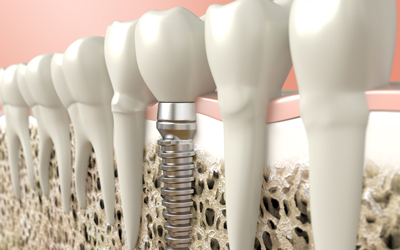Dental implants are artificial tooth roots that are inserted into the jawbone to replace missing natural teeth. Implants and their attached crowns closely mimic the look and function of real teeth. They can make an attractive alternative to dentures and bridges. Dental implant techniques can replace one or several missing teeth. In some cases, an entire set of artificial teeth can be carried on dental implants. A dental implant is a metal “root” (implant) that is inserted into the jawbone. The artificial tooth (crown) is attached to the implant by use of an abutment. In some cases, instead of an artificial tooth, an implant can be fitted with special clips or attachments (similar to press studs) to hold a denture. These studs will minimise movement of the denture.

Dental Implant Restorations

Dental implants
- help to withstand greater bite pressures with dentures
- prevent bone loss in the jaw (this may reduce the risk of adjacent natural teeth becoming loose)
- prevent the formation of hollowed or collapsed cheeks that can occur after tooth extraction (as missing teeth cause bone loss in the jaw)
- are usually surrounded by gum tissue like natural teeth
- may prevent gum recession
- unlike bridges, do not require the cutting and reshaping of neighbouring healthy teeth
- are firmly secured in the jaws
- are usually more comfortable than dentures
- usually do not require separate care routines or special cleaning products, as with dentures or bridges
- like natural teeth, are cleaned by dental floss and brushing with regular toothpaste
A dental implant is designed to last for many years, but poor oral hygiene can shorten its lifespan therefore, good oral hygiene is crucial.
Like real teeth, artificial teeth that are not regularly brushed and flossed can develop deposits (plaque and calculus) that eventually lead to dental problems such as bleeding gums, loss of bone, infection and pain.
Properly maintained implants that are anchored by sufficient bone can last for many years, although repairs may be expected like any other dental appliance.
In order to achieve a good outcome, your implant case may need to be managed by several practitioners. At Cornerstone Dental, we may refer you to an implant surgeon or dental specialist for the placement/surgical stage, and once the implant has healed, arrange to have an implant crown constructed. While this can affect the length of treatment and costs, it is done in the interest of your well-being.
Feel free to contact our staff at Cornerstone Dental on 07 3172 3651 to discuss whether dental implants are the best treatment for your dental problem.
OUR DENTAL SERVICES
We provide a full range of dental services including

Children’s Dentistry

Cosmetic Smile Makeovers and Tooth Whitening

Fillings (decay or broken teeth)

Root Canal Treatment

Dental Implant Restorations

Crowns, Bridges and Veneers

Dentures

Mouthguards

Snoring and Sleep Apnoea Treatment


